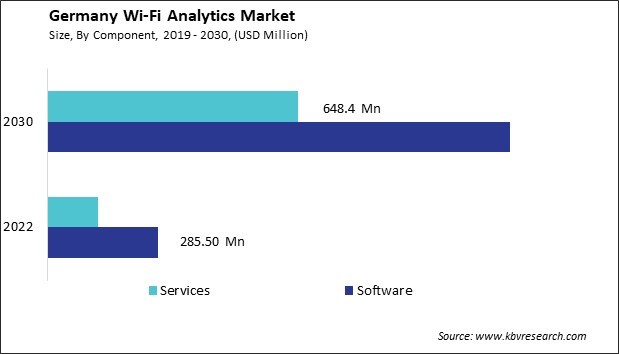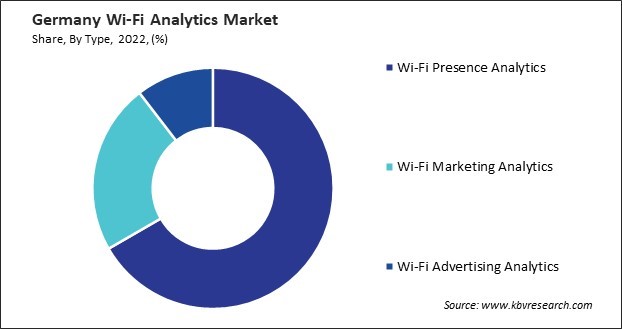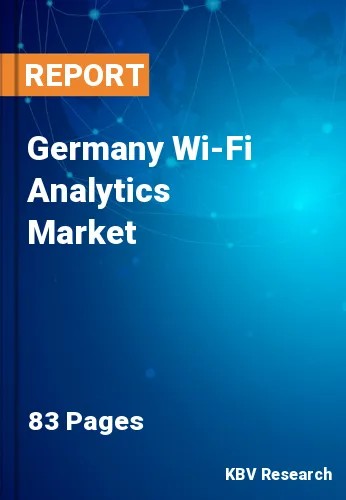The Germany Wi-Fi Analytics Market size is expected to reach $1.8 billion by 2030, rising at a market growth of 20.6% CAGR during the forecast period.
The wi-fi analytics market in Germany has experienced notable growth, partly driven by the integration of business intelligence (BI) and operational insights with Internet of Things (IoT) technologies. This convergence has enabled businesses to gain deeper insights into customer behavior, optimize operations, and enhance decision-making processes.

Integrating BI and operational insights into wi-fi analytics allows businesses in Germany to make data-driven decisions. Businesses can gain a comprehensive view of their operations and customer behavior by analyzing wi-fi data alongside other operational data sources, leading to more informed decision-making processes. BI and operational insights integrated into wi-fi analytics solutions help businesses in Germany ensure compliance with regulations and governance requirements. Businesses can better monitor their compliance efforts and mitigate risks by centralizing data and providing visibility into key metrics.
Moreover, Germany has experienced a significant increase in Internet of Things (IoT) penetration across various industries and sectors. Germany is known for its leadership in Industry 4.0, which focuses on the digital transformation of manufacturing and industrial processes. As part of these initiatives, there has been a concerted effort to adopt IoT technologies to enable smart factories, predictive maintenance, and data-driven decision-making.
The healthcare sector in Germany has been incorporating IoT devices to enhance patient care, monitor medical equipment, and streamline healthcare operations. IoT-enabled medical devices and telemedicine solutions have seen increased adoption, especially during the COVID-19 pandemic. IoT devices are increasingly deployed in retail environments for inventory management, customer analytics, and personalized shopping experiences. Consumer IoT devices, such as smart homes and wearables, are also gaining popularity among German consumers.
IoT integration enables real-time data streaming and analysis, allowing businesses in Germany to access up-to-date insights into network performance, user behavior, and environmental conditions. This real-time capability is especially valuable for applications requiring immediate action or response, such as retail foot traffic monitoring or industrial equipment maintenance. According to the International Trade Administration, amid the second year of the COVID-19 pandemic in 2021, Germany witnessed a notable surge in health expenditure, reaching a substantial 474.1 billion euros. This translated to an average of 5,699 euros per inhabitant. The year-on-year increase in per capita and total health expenditures was striking, marking a substantial 7.5% rise, representing the most significant uptick since the initiation of calculations in 1992.
Parallelly, a comparable trend emerged in the wi-fi analytics market in Germany. Mirroring the substantial growth in health expenditure, the demand for wi-fi analytics solutions experienced a noteworthy uptick. The parallel expansion in these sectors indicates a broader societal shift towards increased healthcare and digital infrastructure investment. This confluence of trends suggests a heightened awareness and commitment to advancing public health and technological connectivity in the face of evolving challenges, such as the ongoing pandemic.
Germany has a significant urban population with a high level of urbanization. This concentration of people in urban areas has spurred the need for smart solutions to address urban challenges such as traffic congestion, pollution, and resource management. The German government has proactively promoted smart city initiatives through various programs and funding schemes. These initiatives aim to support cities in adopting technologies that improve infrastructure, public services, and quality of life for residents.
Smart mobility solutions, including public transportation systems, electric vehicles, and intelligent traffic management, are a key focus in German smart cities. These solutions aim to improve transportation efficiency, reduce congestion, and promote sustainable mobility options. In Berlin, for example, the city has been focusing on various smart city projects, including initiatives to improve mobility and transportation. One notable project is developing a digital mobility platform that integrates different modes of transportation, such as public transit, bike-sharing, and car-sharing services, to provide users with seamless and sustainable mobility options.
Hamburg has been recognized for its efforts to become a smart city through initiatives like the "smart city Hamburg" strategy. The city has implemented projects focused on digitalization, mobility, energy, and environmental sustainability, aiming to improve residents' quality of life while reducing resource consumption and environmental impact.
Smart cities generate vast amounts of data from various sources, including IoT devices, public wi-fi hotspots, and municipal services. wi-fi analytics enables cities to analyze this data to gain insights into citizen behavior, traffic patterns, and resource utilization, which can inform decision-making processes and improve the efficiency of city operations. Therefore, the growth of smart cities and communities in Germany has driven the demand for wi-fi analytics as cities seek to leverage data and connectivity to improve urban services, optimize infrastructure, and enhance residents' overall quality of life.
Event venues, stadiums, and public spaces in Germany are using wi-fi presence analytics to optimize crowd management, security, and facility operations. By monitoring wi-fi signals from mobile devices, venue operators can understand visitor flow, manage capacity, and enhance the overall visitor experience during events and gatherings. The increasing availability of wi-fi presence analytics provides businesses and organizations in Germany with valuable data-driven insights into customer behavior and preferences. This data can inform strategic decision-making, marketing campaigns, and operational improvements, leading to better business outcomes.
Wi-Fi presence analytics can help manage passenger flows, optimize queue management, and improve overall operational efficiency in transportation hubs such as airports, train stations, and public transit systems. This ensures smooth and efficient transportation services in densely populated areas. The increasing demand for wi-fi presence analytics in Germany reflects a growing recognition of the value of location-based data in various industries. As businesses and public institutions seek to leverage data for better decision-making and improved services, the demand for advanced analytics solutions like wi-fi presence analytics is expected to continue rising.

The wi-fi analytics market in Germany includes a range of participants offering diverse solutions and services. One prominent German wi-fi analytics market player is Cisco Systems, Inc., a global leader in networking and IT infrastructure solutions. Cisco offers a range of wi-fi analytics solutions, including its Cisco Connected Mobile Experiences (CMX) platform, which enables businesses to gather location-based data from wi-fi networks and use it to enhance customer experiences, optimize operations, and drive business growth. Cisco's networking expertise and extensive presence in the German industry position it as a key player in the wi-fi analytics market.
Purple, a UK-based company, is also active in the German wi-fi analytics market, offering a cloud-based wi-fi analytics and marketing platform. Purple's platform gives businesses insights into customer behavior, foot traffic patterns, and demographic data gathered from wi-fi networks. The company's focus on delivering actionable insights and enabling personalized marketing campaigns has positioned it as a notable player in the wi-fi analytics space, particularly in the retail, hospitality, and leisure industries.
These industry participants, along with others operating in the wi-fi analytics market in Germany, contribute to the growth and evolution of the industry by offering innovative solutions that leverage wi-fi networks to gather valuable data and drive business outcomes. Their expertise and capabilities in networking, data analytics, and customer engagement play a crucial role in helping businesses harness the power of wi-fi for strategic decision-making and operational excellence.
Euclid Analytics specializes in wi-fi analytics solutions focused on retail and brick-and-mortar businesses. Their platform provides insights into customer behavior, store performance, and marketing effectiveness based on wi-fi and other location-based data sources, catering to the specific needs of retailers looking to optimize their physical spaces.
USA Wi-Fi Analytics Market, by Component
By Type
By Deployment
By End-use
Our team of dedicated experts can provide you with attractive expansion opportunities for your business.

